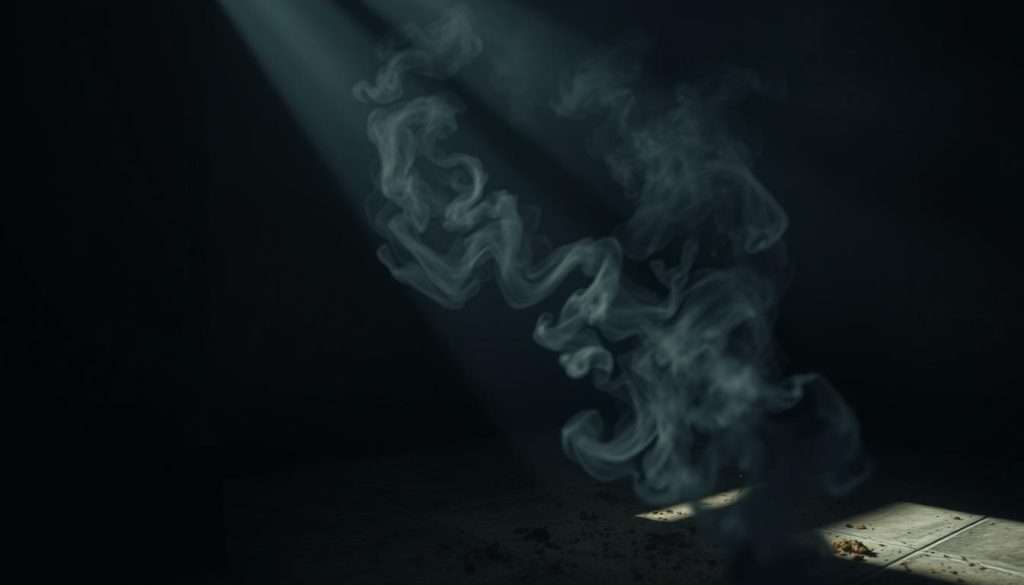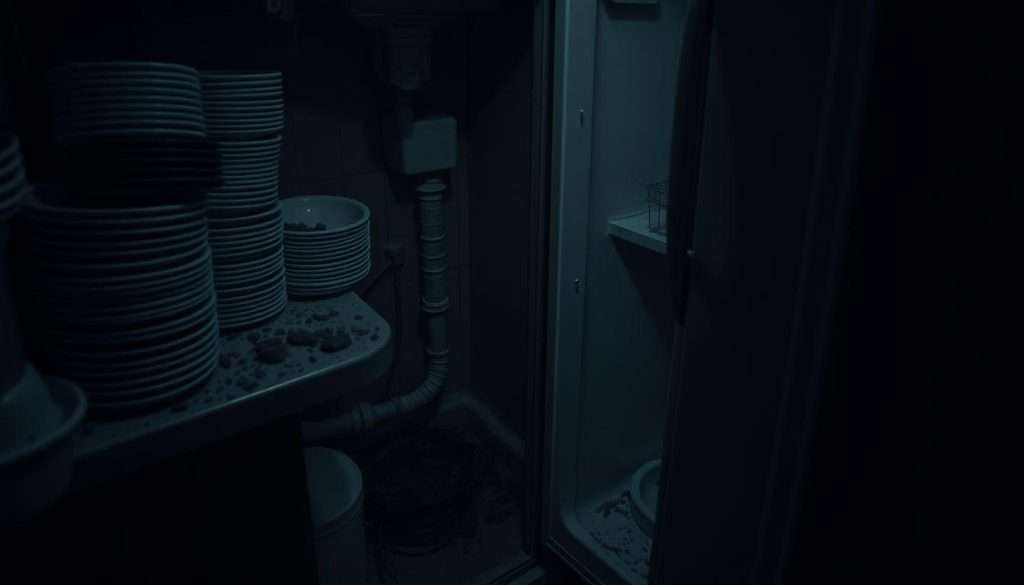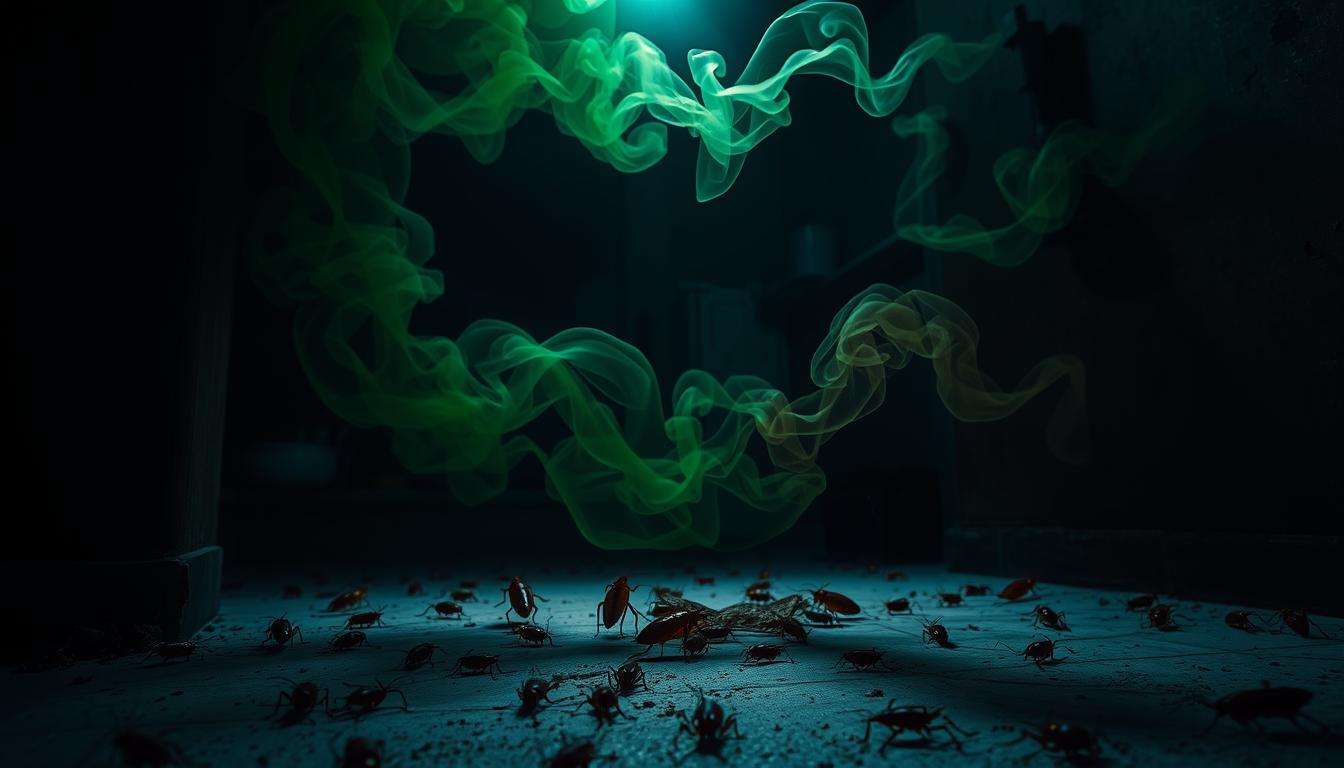Many of us wonder about the smell of cockroach infestations. Cockroaches are known for their fast reproduction and bad smells. We’ll explore the musty odors they cause and how they signal a problem in your home. Knowing these smells helps you act fast to keep your home clean and safe.
The smell can vary, but it often smells musty and gets worse as the problem grows. Learning about these smells helps you know when you need professional help.
Key Takeaways
- Cockroach infestations can produce a musty, oily odor that worsens over time.
- Understanding these smells can be crucial for early detection and remediation.
- Addressing odors promptly can contribute to a healthier living environment.
- Identifying the smell can help differentiate it from other household sources of odor.
- Professional extermination may be needed as odors intensify, indicating a serious problem.
Understanding the Distinct Odor of Cockroaches
Cockroach infestations have a unique and bad smell. This smell comes from their secretions, droppings, and dead bodies. Knowing where this smell comes from helps you know how bad the problem is.
What Causes the Odor?
The smell of cockroaches comes from different things they release. They give off fatty acids, which smell oily. This smell gets worse as more cockroaches appear. Dead skin and droppings also add to the bad smell. Here are some reasons for the cockroach smell:
- Pheromones released for communication.
- Secretions from their bodies, particularly oleic acid when decomposing.
- Remnants of their feces that hang around in the environment.
How the Smell Changes with Infestation Severity
As more cockroaches appear, the smell gets stronger. At first, the smell might be slight. But, as the problem gets worse, the smell becomes very bad. It can even affect the air in your home. Here’s how the smell changes with the infestation:
| Infestation Level | Description of Odor | Identifying Smell Intensity |
|---|---|---|
| Low | Faint musty odor | Barely detectable; not always noticed |
| Moderate | Noticeable oily stench | Odor becomes hard to ignore; possible headache |
| High | Overpowering musty and oily smell | Impossible to miss; requires immediate action |
Knowing about these smells helps you find ways to get rid of cockroaches. It also keeps your home clean.
Aromatic Characteristics of Cockroach Infestation
The smell of cockroach infestations is unforgettable. Homeowners can spot problems early by knowing these smells. The smells are musky and rancid, making them unpleasant.
Description of Common Smells
Cockroaches bring bad smells into your home. These smells come from pheromones, waste, and decaying organic matter. You might smell:
- Musky scent – This smell fills the air and lasts a long time.
- Rancid stink – A strong smell that’s like sour or rotten things.
These smells can make a place feel dirty and uncomfortable. Many people look for pest control when they notice these smells. Knowing about these smells helps you find and stop cockroach problems. For more, check out this resource.
Impact of Environmental Factors on Odor
Environmental factors greatly affect the smell of cockroach infestations. Things like humidity, temperature, and space conditions matter a lot:
- High humidity helps cockroaches breed and makes the musky scent stronger.
- Warm temperatures make cockroaches more active. This means they release more pheromones and waste, making the smell worse.
- Damp places, like kitchens and basements, are great for cockroaches. This makes the bad smell even stronger.

Keeping your home dry and clean can help avoid these smells. It also stops cockroaches from living in your home.
What Does a Cockroach Infestation Smell Like
Knowing what a cockroach infestation smells like helps you act fast. A musty odor is a big sign of an infestation. This smell is like dampness or mold, often found in basements or kitchens.
Identifying the Musty Odor
The smell of cockroach infestations gets worse with more roaches. In bad cases, the smell can be very strong. Here are important things to remember:
- The smell is strongest in damp, dark places where roaches hide.
- Feces, looking like small pellets, can smell bad, especially when mold grows on them.
- Some cockroach types, like the Oriental roach, smell very bad.
Comparing with Other Household Smells
It’s key to tell the smell of cockroaches from other smells in your home. For example, a stale smell can be mistaken for moldy food or damp clothes. Knowing these differences helps you spot the problem faster:
- Moldy food smells bad but can smell different based on the food.
- Musty basements smell similar, but looking for droppings can confirm it.
- An unusual sweet smell might come from organic matter breaking down, making it harder to tell.
By watching for these smells, you can tackle the problem quickly. This helps avoid health risks from cockroach infestations.
Where to Expect Odors in Your Home
Cockroaches hide in dark, damp spots. Knowing where to look for their smells is key. They like places where it’s dark and wet, leading to noticeable odors in your home.
Common Hiding Spots for Cockroaches
Finding where cockroaches hide helps with pest control. Here are some common places:
- Behind kitchen appliances, such as the refrigerator and stove
- Inside cabinets and pantries, especially where food is stored
- In crawl spaces and basements, where moisture can accumulate
- Around pipes, drains, and sinks in bathrooms and kitchens
- Under sinks and behind furniture
Rooms Most Affected by Cockroach Smells
Cockroach smells often gather in certain rooms. Here are the most affected areas:
- Kitchens: Kitchens have food and moisture, attracting cockroaches and their smells.
- Bathrooms: Bathrooms are damp, making them a favorite for cockroaches.
- Crawl Spaces and Basements: These areas are dark and damp, perfect for cockroaches.
Knowing where cockroaches hide and where smells are most common helps. It makes finding and getting rid of odors easier.

| Location | Reasons for Cockroach Attraction |
|---|---|
| Kitchens | Food sources and moisture |
| Bathrooms | High humidity levels |
| Crawl Spaces and Basements | Dark and damp conditions |
| Behind Appliances | Heat and food particles |
| Under Sinks | Moisture from plumbing |
Health Implications of Cockroach Odors
Cockroach odors are more than just a nuisance. They can pose serious health risks in our homes. It’s important to know these risks, especially if you have allergies or asthma.
Impact on Allergies and Asthma
Cockroach odors often mean there are health risks around. Proteins in their saliva, feces, and skin can cause severe allergic reactions. This is especially true for children and people with asthma.
Many people face:
- Respiratory issues, such as wheezing and coughing.
- Increased allergy symptoms, including itchy eyes and nasal congestion.
- Exacerbation of asthma, which can lead to more frequent attacks.
Long-term exposure to cockroach allergens can lead to serious respiratory problems and persistent allergies. Keeping your home free of cockroaches is crucial for your health.
Pathogens and Health Risks Associated with Infestation
Cockroaches spread harmful pathogens as they move around your home. They carry bacteria that can cause illnesses like:
- Food poisoning
- Salmonella
- Typhoid fever
- Dysentery
Their droppings and secretions can contaminate food and cooking surfaces. This increases the risk of stomach problems. Cockroaches are tough, reproduce fast, and carry parasites. This adds to the health risks they bring.
Signs of a Cockroach Infestation
Finding out if you have cockroaches is not just about smells. Seeing them is a big help too. Knowing what to look for at home is key.
Beyond the Smell: Visual Indicators
Seeing signs can help confirm if you have roaches. Look for:
- Roach Droppings: These are dark, small pellets like rice. Seeing them in kitchens or on walls means roaches are around.
- Egg Cases: Find dark brown egg casings about an inch long. A female can carry up to 30 nymphs, showing a big problem.
- Skin Shedding: Roaches shed their skin many times, leaving shells around the house.
- Visible Roaches: Seeing live or dead roaches is a clear sign. They are mostly active at night, but seeing them in the day means a big problem.
The Role of Fecal Aroma in Detection
The smell of cockroach feces is a warning sign. This smell gets stronger as the problem grows. New allergies from roach debris also mean you have a problem. Watching for both visual signs and the fecal aroma helps you act fast.
For more info, check out this detailed guide on cockroach signs. Knowing these signs lets you stop problems before they start.
Dealing with Cockroach Odors
When you find cockroach odors, it’s time to clean and prevent them. These steps help get rid of the smell and keep your space healthy.
Cleaning and Prevention Strategies
Start by cleaning well where cockroaches were found. Here’s how:
- Vacuum and sweep to get rid of droppings and mess.
- Use mild soap to clean surfaces and remove food and roach secretions.
- Wash fabrics like linens and curtains to get rid of smells.
Using smells that cockroaches don’t like can also help. Try:
- Bay leaves
- Peppermint oil
- Cedar
- Eucalyptus
- Catnip
To keep cockroaches away for good, do these things:
- Seal up cracks and holes to stop them from coming in.
- Fix leaks and dry out damp spots that cockroaches like.
- Keep food areas clean and dry.
- Use air purifiers to clean the air and get rid of smells.
By cleaning often and taking these steps, you can stop cockroaches from coming back. This makes your home more comfortable.
Conclusion
Knowing about cockroach infestation odor is key to a healthy home. This smell is not just a sign of a problem. It’s also a warning for homeowners and DIY fans.
Quickly spotting these smells helps you act fast. This can stop bigger problems before they start.
Keeping your home clean is a big step against cockroaches. Simple habits like sealing food and throwing away trash help a lot. But, if cockroaches get out of hand, experts are needed.
Experts have the tools and know-how to get rid of them. They are crucial for solving big infestations.
Being ahead of cockroach smells and knowing what they mean is important. It helps keep your home safe and your family healthy. Taking action quickly is always best.
Knowing a lot about pests is a big help. It fights against common pests in our homes.
